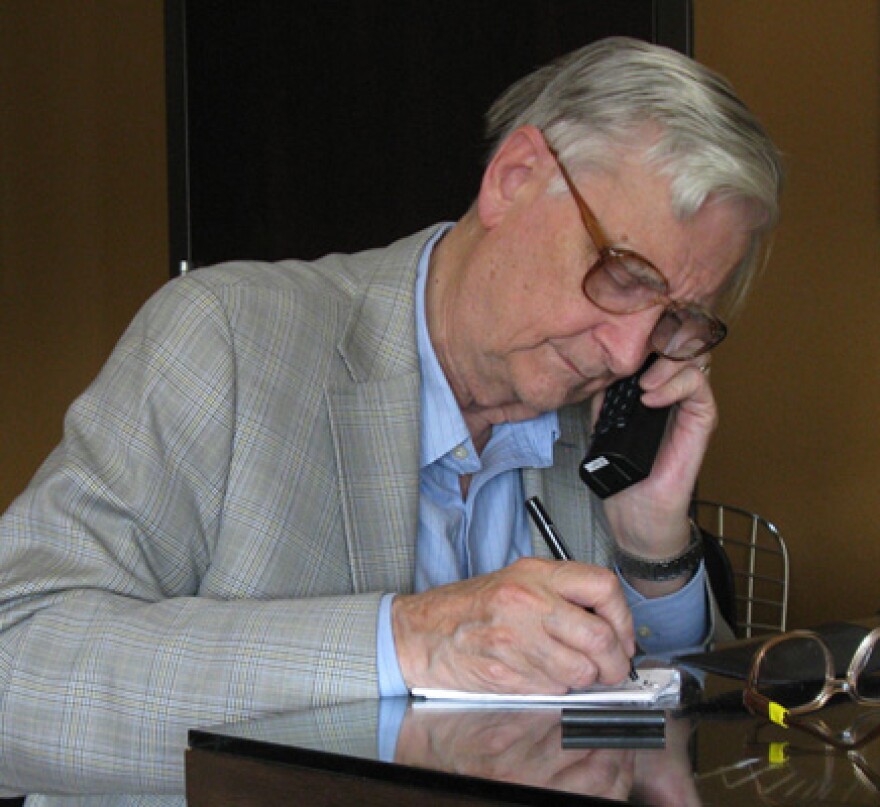Biologist Edward O. Wilson is an emeritus University Research Professor at Harvard. Through his lifelong research on the behavior of ants, he has transformed the disciplines of ecology and evolution, developing new theories and pioneering the field of sociobiology.
Wilson, who is 82, was in St. Louis this week to deliver the keynote address at a University of Missouri-St. Louis interdisciplinary conference.
He told St. Louis Public Radio's Véronique LaCapra that his long and successful career started with a childhood fascination with bugs.
--
WILSON: I began when I was about nine years old, catching butterflies and gathering all sorts of insects in Washington D.C.’s Rock Creek Park. And never looked back. I decided I was going to be an entomologist, and I did.
I had a snake period, I had a frog period, growing up in Alabama, but then I returned to the insects and the ants and I never left.
LACAPRA: Now you’ve won two Pulitzer Prizes. And one is actually for a large-format, more than 600-page, I think, book, all about ants. Why ants? What made you want to write such a comprehensive work about an insect that probably a lot of people don’t even notice, or at best think is a nuisance?
WILSON: They most emphatically, and let me repeat, most emphatically, should notice. Because ants are the dominant insects of the world, they make up something like three-fourths of all of the biomass of all the insects. And they dominate the environments that they’re in, the land environments.
LACAPRA: What’s in a 600-plus-page book about ants?
WILSON: Everything. It is the reference work you want to use if you want to find out anything about ants, at least known to 1988. And most of that information is still solid. I mean it has not been superseded.
LACAPRA: You also pioneered the field of sociobiology. What is that, and why is it significant?
WILSON: Sociobiology is the scientific study of the biological foundation of all forms of social behavior in all kinds of organisms. And I put that together in the late '60s, as part of a review of all the social insects that I did.
Before we did The Ants, I did another monster book, called The Insect Societies that dealt with that. And then in 1975, a third monster book, called Sociobiology: the New Synthesis, in which I put together just about everything we knew about the evolution and nature of societies.
And sociobiology is now much accepted, mainstream discipline, of biology. But in those days, when I brought up humans and said, maybe humans follow the same rules, maybe we have a biological basis to our social behavior. And there’s a lot of evidence for that, but that made the book extremely controversial.
LACAPRA: So if I may say this, you're going to be turning 83 in June, is that correct?
WILSON: That's right.
LACAPRA: What do you consider to be the greatest achievement of your career so far?
WILSON: It depends on what criteria I would apply to myself or others. I have created several fields of science that are quite successful. But I suppose that others would have done that, because there wasn't that much of a rush to do it. Whereas, efforts that I've made in conservation. I'm on my way in just a week, for example, to Africa to work in the Gorongosa Park, helping to rehabilitate it, help to make it a great eco-tourism center and so on.
LACAPRA: That's in Mozambique.
WILSON: Mozambique, yeah, north of South Africa. And I would say that was a case of emergency room response, which, if I hadn't been doing it — whatever I could contribute along with many others — if I hadn't been doing it, much of it would be too late. So that's my best achievement.
Web Extras
- Wilson describes his theory of island biogeography:
http://stream.publicbroadcasting.net/production/mp3/national/local-national-1010590.mp3
- Wilson gives an example of the biological basis of human behavior:
http://stream.publicbroadcasting.net/production/mp3/national/local-national-1010593.mp3
- Wilson gives his perspective on free will:
http://stream.publicbroadcasting.net/production/mp3/national/local-national-1010582.mp3
- Wilson gives his perspective on the future of organized religion:
http://stream.publicbroadcasting.net/production/mp3/national/local-national-1010592.mp3

